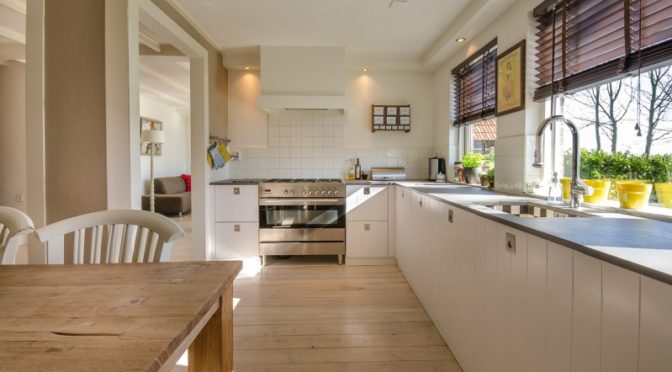
Regardless of where you stand on whether hardwood floors belong in a kitchen, you’re going to need some kind of an oven in your kitchen for it to be fully functional. It doesn’t matter whether you’re the next Gordon Ramsay or simply cook whenever your family gets together during the holidays; an oven can make or break a quality cooking session. If you’re planning a new kitchen setup, whether through remodeling your existing kitchen, an addition to your home, or a brand new construction project, you’re going to need to decide whether you want a freestanding range or a wall oven. Both arrangements have their advantages and disadvantages, and today we’ll review the pros and cons to help you choose the better option for your space.
The benefits of wall ovens include cooking capacity and ease of access
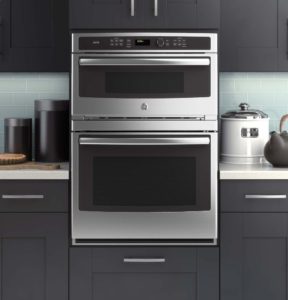
Because they’re built into cabinetry and don’t need to support themselves structurally, wall ovens are far more efficient than freestanding ranges when it comes to cooking capacity. A single wall oven will offer as much internal cubic feet as a 36″ wide single oven range. You’ll get even more space if you choose a double oven; a double wall oven will feature a pair of identical, full-sized ovens, which you won’t get when you buy even a 48″ freestanding range unit.
While you will get two ovens in a 48″ double range, one of the ovens will be about half the size of the other, and compared to a double wall oven or a single range, you’ll really be dealing with a 1.5 oven instead of a true double oven. To get a true full double range oven, you’ll need a 60″ unit, and the vast majority of kitchens won’t have the space to accommodate a unit that large.
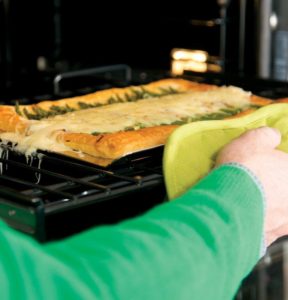
Aside from the increased cooking capacity relative to range ovens, a wall oven is simply easier to access. They’re generally installed to be reachable by an average-sized man or woman, which means you’ll be able to operate one at eye level without crouching, stooping, straining, kneeling, or bending the way you would with a range. Most people appreciate this advantage, particularly when moving hot foods or heavy cookware, where changing height can be dangerous in addition to uncomfortable. Looking ahead, a wall oven is also a far better choice for aging in place due to the reduced demands it places on the body for flexibility. To put it simply, if you plan on living in your home for many years and love to bake, you’ll appreciate a wall oven more and more (and a range less and less) as the years go by.
However, you’ll need multiple cooking areas in your kitchen and deeper wallets
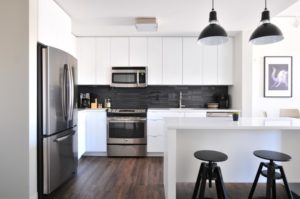
Perhaps the most obvious disadvantage of a wall oven is that it doesn’t come with a cooktop surface. As a result, unless you simply bake cakes, microwave soup, and prepare peanut butter and jelly sandwiches on your countertops, you’re going to need to invest in a separate cooktop so you can use pots and pans for boiling, frying, and general cooking tasks.

As a result, you’ll now have two separate cooking areas in your kitchen for preparing food with heat, which means you’ll either need more space in your kitchen or, more likely, you’ll have less space left over for storage and general food preparation. If you’ve got a giant kitchen (e.g., one of the aforementioned ones capable of supporting a 60″ double range oven), this won’t be a problem. But if your home, townhouse, or condominium is like most, you’re going to struggle for space allocation if you dedicate so much of it to cooking appliances. And of course, those cooking appliances aren’t free; you’re going to need to buy a cooktop if you buy a wall oven.
A freestanding range is more space-efficient, aesthetically pleasing, and cheaper
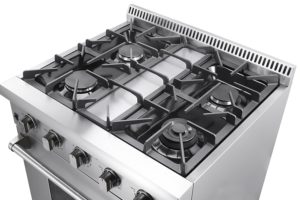
In contrast to a wall oven, when you buy a freestanding range, you make better use of both your space and money, as you have both cooking appliances–the oven and the cooktop–in a single appliance. This can save you several thousand dollars, especially if you’re buying professional-grade equipment. Additionally, you also save several valuable square feet in your kitchen, which can be extremely important if you live in a smaller home or a typical one with a smaller kitchen. Whether you choose a 30″, 36″, 48″, or 60″ unit, you’ll be done the first time, and be able to cook a banquet without hopping from one appliance to the next, which also makes it more efficient when you’re knee deep in food preparation.
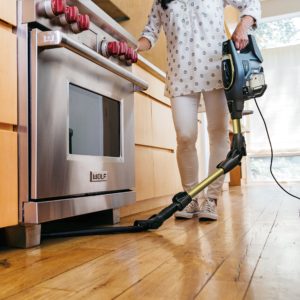
Beyond the space and financial savings inherent in the freestanding range design, you’ll also enjoy a more industrial and stylish look, if this matters to you, compared to when choosing a wall oven. The eye-catching elements are undoubtedly the large tactile knobs on the front of a range. Some manufacturers have gone as far as making their knobs the most recognizable parts of their brands in a world of stainless steel clones; Wolf, for example, has famous oversized red knobs that immediately set them apart from otherwise identical ranges. Similarly, companies like AGA and La Cornue have brought flair and pizazz to the range world with their uniquely colored and styled appliances. There simply isn’t that much variety in wall ovens, which are often designed to blend into cabinetry to make them less obtrusive when cooking.
However, accessibility and cooking capacities are limited compared to wall ovens
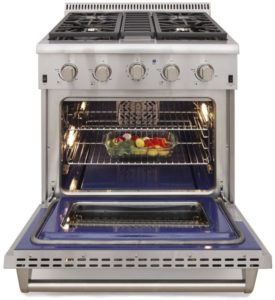
That said, the benefits of the wall oven are the range’s drawbacks. While the stovetop will be as easily accessible as any cooktop paired with a wall oven, you’re going to need to stoop, crouch, kneel, and bend to reach the contents of your oven whenever baking with a range. This will only get harder with age, and it’ll always be more of a challenge when dealing with hot or heavy foods than the work you’d need to remove something from a wall oven (which is next to no work at all).
Similarly, as mentioned above, you’ll deal with a limited cooking capacity. A 30″ range is the most common size, and you’ll need a 60″ range if you want a pair of full-sized ovens. While it’s true that the majority of people won’t frequently use double ovens aside from professional cooks or matriarchs in large families, it’s still something to keep in mind, particularly if you’ve ever had a pair of full-sized double ovens and enjoyed using them.
If you want a range, which are the best professional options for practical prices?
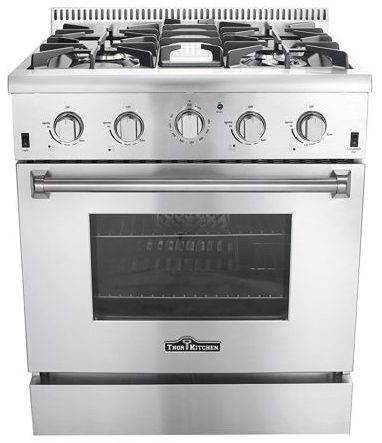
If you’re ready to buy a range, you may have trouble choosing from the wealth of options on the market. Fortunately, you don’t need a $4,000 range to find a blend of power, performance, style, and reliability; you can often find professional-grade machines for consumer prices if you know which brands to choose. In our books, two of the best value ranges on the market right now are the Thor Kitchen HRG3080U 30″ range (reviewed here) and the Kucht KRG3080U range (reviewed here). Both are identical; you just pay more for the Kucht because it comes with better customer service.
![]() You can buy the Thor Kitchen HRG3080U 30″ freestanding gas range here on Amazon or buy the Kucht KRG3080U range here instead.
You can buy the Thor Kitchen HRG3080U 30″ freestanding gas range here on Amazon or buy the Kucht KRG3080U range here instead.
![]() Canadians can buy the Thor Kitchen HRG3080U 30″ freestanding gas range here on Amazon or buy the Kucht KRG3080U range, which is cheaper, instead.
Canadians can buy the Thor Kitchen HRG3080U 30″ freestanding gas range here on Amazon or buy the Kucht KRG3080U range, which is cheaper, instead.
 If you find our research on PMC helpful, you can follow our efforts to keep maniacally reviewing home appliances by shopping through our links above. We promise to keep fighting the good fight against every horror children, animals, and grown, yet messy humans can inflict upon a clean home.
If you find our research on PMC helpful, you can follow our efforts to keep maniacally reviewing home appliances by shopping through our links above. We promise to keep fighting the good fight against every horror children, animals, and grown, yet messy humans can inflict upon a clean home.

